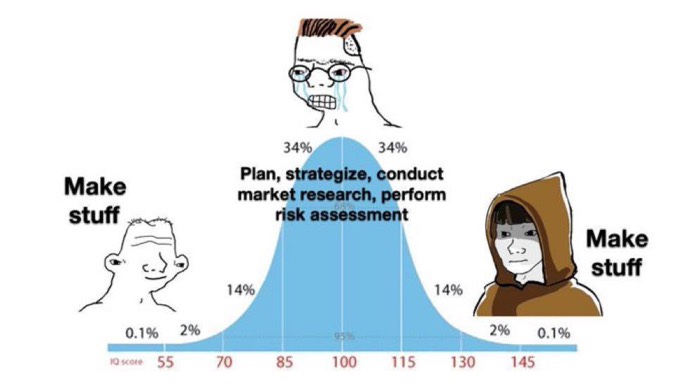I’ve been in a hazy “did that happen place” emotionally after the news that Stack Overflow, where my husband spent 8.5 years, sold for $1.8B. Obviously it’s a lot of money to just appear into our lives. It’s not the first exit for Alex Miller or me. I’ve had 2 acquisitions for companies I have founded & he’s had an IPO for a company he was early to join. I also lived through multiple exits, financings IPOs & bankruptcies as a kid as I’m the child of a startup family. So why does this hit different?
I think part of it is that our other wins tended to come from “faster” companies. My first acquisition came within 2 years of founding. It wasn’t a lot of money but let me pay off student debt & get more stable. Alex was with Yext for a comparably shorter period and when it IPO’d he’d long ago left for Stack Overflow. And that was only a win because he was lucky enough to be able to borrow money to exercise his Yext options or it would have meant nothing. That happens a lot to early stage employees. They cannot afford to exercise and get nothing when a big exit happens. It happened to me when the company that bought mine exited to someone even bigger. I couldn’t afford to exercise. I never had the heart to calculate how much I would have made.
We’ve had secondaries over the years. Sometimes equity gets taken off the table in later stages financings and it benefits early employees. Those changed our calculus a lot when it happened to us. We put together a financial plan and a future as a family with our startup earnings. We made decisions based on whose turn it was to risk & who to run downside. Being a startup spouse means a constantly balancing act of supporting years of low salaries, long hours and stress. And while it’s not easy to be the wife of an early stage employee it’s probably even harder to be the husband of a founder. Startup families live through a lot together.
Stack Overflow was “the” company in many ways for Alex where he spent the better part of a decade and the majority of our marriage working to build the company up. He was employee 32 when he joined as chief of staff. When he left it was over 300 employees and he was the GM of the SaaS business.
When he left Stack we didn’t expect a payday beyond what salary he had earned and perhaps a bit of secondaries. He’d done good work and built amazing things but when you leave you don’t want have the emotional capacity to think about things like big acquisitions or IPOs. When Alex left Stack it was a deeply emotional process for us. A lot of therapy for both of us. Because startups aren’t just the person it is their family that consents as well to these long journeys. Remember that every executive team member or founder has a family that will live through this startup experience too.
After 8 years I knew Alex needed a change. He had given Stack his all. His absolute best. But leaving was hard. In order to leave a company where you invested your whole self (and your family’s) you have to come to terms with how you feel. We cried. We worried. But Alex made the choice. And we didn’t look back. It’s too painful in some ways. You love your startup
You keep in touch with everyone. Alex remains friends with the entire team. We share hobbies & interests and a million group texts with topics as varied as hydroponic tomatoes m, our crypto portfolios and hunting season. We stay at each other’s homes. The bond is deep in startup teams.
Given that bond it’s almost funny how when you leave your imagination on big outcomes can stop. The thing you dedicated yourself to for years is now growing and thriving without you. It never leaves you even if you need some distance.
When we got the call the number was overwhelming. The distance we had created suddenly evaporated. Alex burst into my room where I was meditating and told me the strike pierce. We did some calculations. We checked them. It couldn’t be? It was. The startup had finally delivered the check. We’d done it. Another startup made it.
I want people to know that this kind of largess is mostly random. Everyone works hard in Silicon Valley. Startups are a choice & a state of mind and those of us that chose to do it willingly go into ideas doomed to failure. Or meant for the stars. And it can feel like a crap shoot. Idiots get enormous paydays and brilliant innovators barely make enough to scrape by. The meritocracy isn’t as real as we think. This isn’t to suggest that the Stack Overflow team doesn’t deserve every penny. They do. We earned the payout. The bad years were hard. Miserable. But everyone believed in the community & the power of software developers. But also no one earns these big paydays. It’s a gift. And we are grateful for it.
